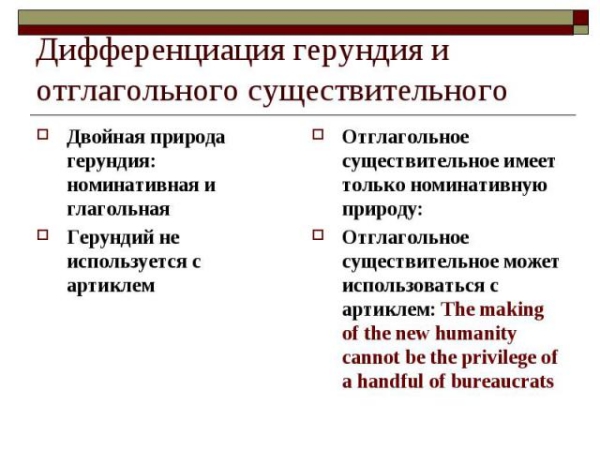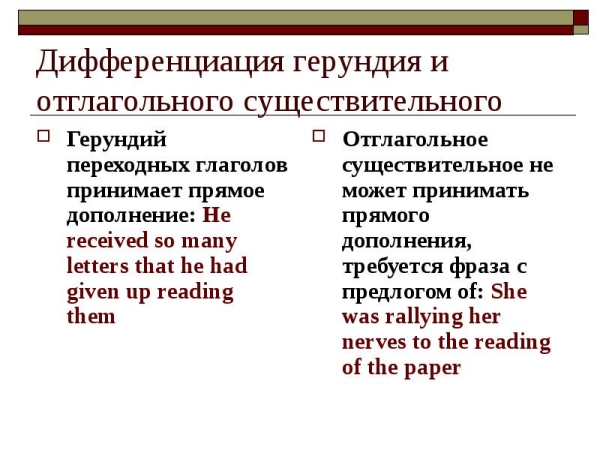verbal noun (verbal noun) – special kind characteristic of many languages. In Russian, these are nouns such as run(from run away), singing(from sing) other. These nouns are formed either by truncation (run-run) or in a suffix way (sing-sing).
Verbs and verbal nouns are two parts of speech that have a procedural connotation in semantics (meaning): the verb denotes an action, process or lack of action, and the verbal noun denotes the result of an action.
- Formation of verbal nouns
Verbal nouns have different ways education. The first and most productive of them is the addition of flexion – ing to the stem of the verb:
| Verbs | verbal noun |
| to read | reading |
| to smoke | smoking |
| to break | breaking |
| to sit | sitting |
| to begin | beginning |
| to be | being |
| to wait | waiting |
| to swim | swimming |
| to sing | singing |
| to steal | stealing |
| to repair | repairing |
A verbal noun is usually translated by a noun and/or a subordinate clause:
He's got that silly slighting way of talking.He has a disgusting way of speaking.
The second way of formation is affixal, that is, the addition of a suffix or, conversely, its truncation. Accordingly, at this method there are two subspecies:
1) affix
| Suffix | Verbs | verbal noun |
| -ial | to arrive | Arrival |
| -ment | To develop | Development |
| to entertain | entertainment | |
| To establish | establishment | |
| -tion | To organize | organization |
| to produce | production | |
| -ence/-ance | to appear | appearance |
| -er | to teach | teacher |
| -sion | to decide | decision |
2) without affix
| Verbs | verbal noun |
| To help | Help |
| To in'sult (insult) | ‘ insult(insult): accent differences |
| to switch | switch |
| to fall | fall |
| To dump | dump |
| To poison | poison |
| To 'present | Present |
| To offer | offer |
| to let | let |
pay attention to following examples verbal nouns and verbs:
The company made an increase in prices.The company has raised prices.
What an insult! I was so angry with his words!What an insult! I was so angry at his words!
Don't insult me! I'm your boss!Do not insult me! I am your boss!
I was made redundant, so I have to make do with bargains from sales.I got fired, so I have to buy on sales.
Be carefully: that drug May contain poisons. Caution: This medicine may contain poisons.
My friend Stacy asked me to organize her wedding.My friend Nastya asked me to organize her wedding.
This organization isn't’ t reliable. This company is not reliable.
- Gerund and verbal noun
The English language is devoid of pronounced endings, so it is often not clear which part of speech is used, especially if the word is unfamiliar or taken out of context.
AT English language word formation is very common through the transition of a word from one part of speech to another. In this article, we will take a closer look at verbal nouns (Verbal Nouns) and tell you how to distinguish them from verb forms.
In our articles, we have already discussed the topic of words with ending -ing on the example of gerund and continuous verb forms. However, these are not the only representatives of this group.
Verbal nouns are formed from the verb:
to build - building
build - building, structure
to understand - understanding
understand - understanding
In English, almost any verb can be formed into a noun by adding the ending -ing.
A number of verbal nouns do not end in -ing. These words are formed in a different way. They cannot be called exceptions, because it is difficult to single out general principle formation of such words:
to arrive - arrival
arrive - arrival
to sell - sale
sell - sale / sale
to produce - production
produce - production / product, product
How to distinguish nouns with the ending -ing from verb forms
Verbal nouns ending in -ing look like English verb forms. However, they have only the characteristics of nouns.
The noun denotes an object, phenomenon, and not an activity or process
Perhaps one of the characteristics with a very fine line. It should be borne in mind here that in English a noun, including a verbal one, denotes an object, phenomenon, type or area of activity:
Skating is beautiful and spectator. - Figure skating is a beautiful and spectacular sport.
Gerund and verb forms denote the process or action itself:
Skating in the open is great. - Skating in the fresh air is wonderful.(gerund)
I was skating yesterday morning. I was skating all morning yesterday.(verb in continuous form)

Article
A distinctive characteristic of any noun in English is the presence of an article. You can read more about the use of articles here:
The building is too old. - The building is too old.
It should be remembered that the article will not always be placed before nouns, especially before abstract ones:
I ask for respect and understanding. - I ask for understanding and respect.
Definition by adjective or demonstrative pronoun
The function of the article in English is often taken over by demonstrative and possessive pronouns:
Their arrival is unexpected. - No one was waiting for the arrival.
The gerund can also be determined by a pronoun, but not by an adjective. Compare two sentences:
Their talking confused him. He was confused by what they were talking about.(gerund)
Their rude talking confused him. - He was embarrassed by their rude conversation.(verbal noun)
Continuous forms of the verb are never used with either an article or a definition.
Singular and plural forms
The verbal noun has the form plural. Verb and gerund - no:
The reading was dreadful. The film is nonsense. - The reading was terrible. The movie is complete nonsense.(singular)
Spring readings are annual poetry contest. - Spring Readings is an annual poetry competition.(plural)
The noun has no tense form
Unlike verb forms, a verbal noun does not have tense or voice forms. In principle, it is devoid of the category of time, so in sentences we give an example of verb forms:
He was reading dreadfully. - He read terribly.
An interesting fact is that this sentence can be translated into Russian through a noun:
His reading was terrible.
Addition
Without the properties of a verb, verbal nouns can NOT have a direct object after them:
Downloading the film took a long time. - It took a long time to download the movie.(GERUND)

If the use of a verbal noun is essential, the object will be attached through a preposition, most often of:
Downloading of the film took a long time. - It took a long time to download the movie.(verbal noun)
The meaning and translation will not change.
In conclusion, we want to say that sometimes to distinguish a verbal noun from a gerund or verb form in English it is not easy, but our tips will definitely help you. When choosing, it is important to observe grammatical conditions in the use of certain concepts and keep calm!
We wish you success in your studies!
Victoria Tetkina
If you like it, click "Like"!
Including Russian, is a noun formed directly from the verb. Examples: walking(from walk), eating(from eat).
In many semantic and syntactic properties, a verbal noun is close to a gerund (although it is believed that, say, there is no gerund in Russian).
From one verb stem, it is possible to form two types of verbal nouns: deverbative of the name of the action - lat. nomen actionis (sowing, transformation, the rescue) and name actor or the sender of the action - lat. nomen agentis (sower, converter, rescuer).
There are two kinds of verbal nouns in German: the substantiated infinitive, or "process name" (examples: sein - das Sein, schwimmen - das schwimmen etc.) and "result name" in -ung. Most verbs can form either the first or the second form; from "static" verbs, only the first is usually formed, from "dynamic" both forms can be formed (the first has a more abstract meaning).
Applied to oriental languages the verbal noun is traditionally called "masdar" (arab. مصدر ). It is the source of word formation according to the opinion of the scientists of the Basri school of morphology. They justify this by saying that he only points to a certain concept or state. It is simpler and more elementary than a verb, which is burdened with a connection with time and the person of the figure. For example: شُكْرٌ غُفْرَانٌ “gratitude” - “ShuKrun” (the concept is not connected either with time or with the doer), “forgiveness” - GuFraanun (there is also not even a hint of an answer to the questions: “when?” And “who?”)
Verbal nouns are widely used in various styles language:
- In the socio-political and special literature as terms formed in various ways:
- using the suffix -ni-e (-ani-e, -eni-e), for example: concreting, loosening, denationalization, questioning, subtraction, addition, agreement, control;
- with help suffix -k-a, For example: masonry, putty(process and result of the process); in the presence of options of both types ( engraving - engraving, marking - marking, pressing - pressing, grinding - grinding) the first option has a more bookish character;
- in a non-suffix way, for example: departure, bench press, burning, sounding, reset, if there are options ( heating - heating, roasting - roasting, drain - drain) for forms on -tion is preserved major degree bookishness.
- AT official business speech, For example: Candidate nominations have begun; The negotiations ended with the establishment diplomatic relations ; An agreement was reached to extend the agreement for the next five years; Leave request granted.
- In headers, for example: Launch of the space complex; Screening of new films; Presentation of orders and awards; Homecoming. The usual wording of plan items is phrases with a verbal noun as the main word.
